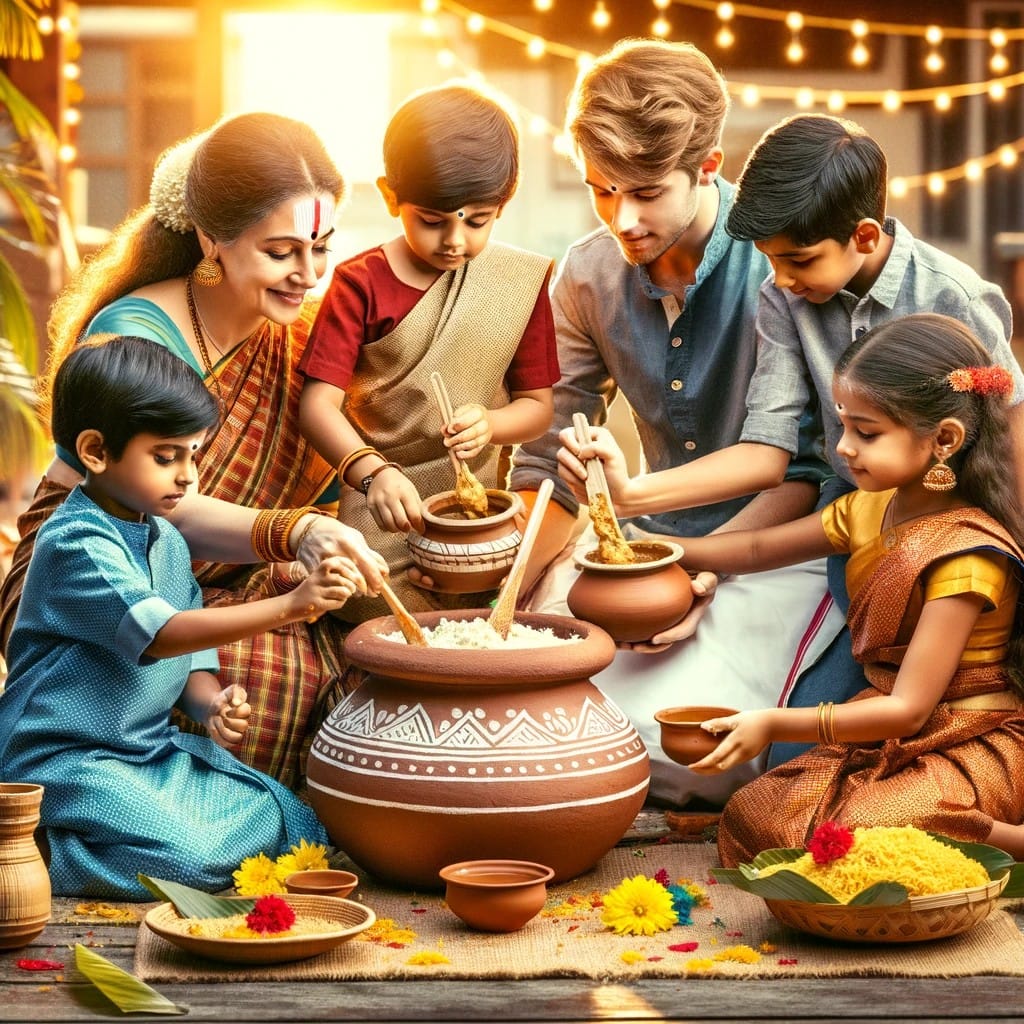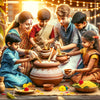2024 Tamil Nadu's Cherished Harvest Pongal Festival - Just a Month ahead

2024 is just a month away. Entire world is preparing for Xmas & New year. But in the heart of South India, as the winter solstice passes and the sun begins its northward journey, the people of Tamil Nadu prepare for Pongal, their most cherished harvest festival. Celebrated with great fervor and joy, Pongal marks not just the end of the harvest season but also a time of giving thanks to nature and renewing bonds of kinship. For those unfamiliar with Tamil traditions, Pongal offers a fascinating insight into a vibrant cultural festival that has been celebrated for centuries.
This extensive guide aims to introduce you to the colorful world of Pongal – exploring its rich traditions, mouth-watering cuisines, and lively festivities that bring communities together. Whether you are a cultural enthusiast, a lover of festivals, or simply curious about new traditions, join us on this captivating journey through the heart of Tamil culture.
Understanding Pongal

Origins of Pongal
Pongal, deeply rooted in the agrarian traditions of Tamil Nadu, is not just a festival but a reflection of the state's symbiotic relationship with nature and agriculture. Dating back thousands of years, its origins are intertwined with Tamil folklore and ancient practices that revered the sun, rain, and livestock, the essential elements for a successful harvest. The festival is a time-honored testament to the gratitude of the people towards these natural elements that sustain their lives.
Pongal in the Tamil Calendar
Significantly, Pongal marks the end of the traditional Tamil month of Margazhi and the beginning of Thai, which is considered an auspicious month for new beginnings. The Tamil saying, "Thai Pirandhal Vazhi Pirakkum," meaning "the birth of the month of Thai paves the way for new opportunities," perfectly encapsulates the spirit of optimism that Pongal brings.
The Meaning of 'Pongal'
The term 'Pongal' in Tamil means "to boil over" or "spillover." Symbolically, this refers to the traditional dish prepared during the festival, where the boiling over of milk and rice is a sign of abundance and prosperity. It represents the wish for overflowing fortunes and the bountiful blessings of nature.
The Four-Day Celebration
- Bhogi Pongal
The first day, Bhogi Pongal, is dedicated to Lord Indra, the god of rain, and is marked by the ritual of cleaning and discarding old belongings. This practice symbolizes the elimination of negative energies and the welcoming of positive vibes into homes and lives. Bonfires made of old clothes and materials serve as a ritual cleansing, paving the way for renewal.
- Suryan Pongal

The second day, Surya Pongal, is the most significant. Devotees offer thanks to Surya, the Sun God, crucial for agriculture. Families gather to cook the Pongal dish outdoors in earthen pots, allowing it to boil over, which is considered a good omen. The freshly harvested rice, combined with milk and jaggery, makes for a sweet concoction that is first offered to the sun and then shared among family and friends.
- Mattu Pongal

The third day, Mattu Pongal, is dedicated to cattle, acknowledging their role in farming. Cows and bulls are bathed, adorned with bells, garlands, and painted horns. In villages, they are paraded through the streets, often accompanied by music and dancing. This day epitomizes the respect and gratitude farmers have for their cattle.
- Kaanum Pongal
The final day, Kaanum Pongal, is a day for family reunions and socializing. People visit friends and relatives, exchanging gifts and sweets. This day strengthens social bonds and encourages communal harmony.
Traditional Attires and Their Significance
During Pongal, women often wear traditional attires like 'Pavadai Sattai' for younger girls and 'Dhavani' (or half-saree) for young women. The Pavadai Sattai, a long skirt with a blouse and a dupatta, is a symbol of youthful elegance. The Dhavani, comprising a skirt, blouse, and a draped dupatta, is a transitional garment signifying the coming of age. These garments are usually vibrant, reflecting the festive spirit, and are often adorned with beautiful patterns and motifs that have been passed down through generations.
Vesti / Dhothi for Men
For men, the traditional 'Vesti' (or Dhothi) is the attire of choice. This unstitched piece of cloth, wrapped around the waist and legs, is both graceful and comfortable. It is usually white or cream, symbolizing purity, and is often paired with a shirt or a traditional kurta. During Pongal, men also wear a version of the vesti known as 'Sattai', which is more formal and used for special occasions.
Culinary Delights of Pongal
Pongal is also a festival that celebrates the bounty of nature through its distinctive cuisine. The dish 'Pongal', which shares its name with the festival, is the centerpiece of the culinary offerings. It comes in two varieties - 'Sakkarai Pongal', a sweet version made with jaggery, and 'Ven Pongal', a savory version. Both are cooked with newly harvested rice, signifying abundance and prosperity.
Alongside Pongal, other dishes like 'Vadai', 'Payasam', and 'Ellu Urundai' (sesame balls) are also prepared. These dishes not only add to the festive spirit but also carry significant cultural and health values, with ingredients that are traditionally known for their nutritive benefits.
Festive Activities and Sports
Jallikattu /Manju Virattu / Veera Vilayattu
The most thrilling aspect of Mattu Pongal is 'Jallikattu', also known as 'Manju Virattu' or 'Veera Vilayattu'. It's a traditional bull-taming sport, deeply ingrained in Tamil culture. Participants attempt to grab the large hump on the bull's back with both arms and hang on to it while the bull tries to escape. Jallikattu is more than just a sport; it's a symbol of bravery and tradition, showcasing the strong bond between humans and animals.
Community Games and Activities
Pongal is also a time for various community games and activities. Traditional games like 'Kabaddi', 'Gilli-danda', and 'Kite flying' are popular. These activities not only provide entertainment but also foster community spirit and camaraderie among the participants.
Pongal Celebrations in Modern Times
The way Pongal is celebrated has evolved over time, adapting to the changes brought by urbanization and globalization. In cities, the space constraints might limit the grandeur of celebrations, but the essence remains the same. Modern technology and social media have also played a role in keeping the younger generation connected with these traditions, allowing them to participate in and promote the festivities, irrespective of their geographical locations.
Pongal Across Borders
With the Tamil diaspora spread across the globe, Pongal has transcended geographical boundaries. It's celebrated in countries like Malaysia, Singapore, Canada, and the USA, where Tamil communities gather to replicate the festivities of their homeland. These celebrations serve as a bridge connecting the younger generation to their roots and keeping the spirit of Tamil culture alive globally.
Personal Stories and Experiences
Including personal stories and experiences from individuals who celebrate Pongal can add a unique and relatable touch to the blog. These anecdotes can highlight the diversity within the Tamil community and how Pongal plays a significant role in their lives.
Pongal – More Than Just a Festival
Pongal is more than a mere cultural festival; it's a celebration of life, nature, and thanksgiving. It reinforces the values of gratitude, togetherness, and respect for nature in an increasingly materialistic world. It's a reminder of the simple yet profound joys of life that come from community and tradition.
Following image representing a different aspect of teaching children about their Tamil heritage in the context of Pongal, have been created. These images visually depict concepts like Cultural Identity and Roots, Preservation of Traditions, Appreciation of Diversity, Family Bonding, and Moral Values. You can view and use these images for your Instagram posts or other social media campaigns related to Shivangi's Pongal collection.

Conclusion
As we conclude this journey through the vibrant festival of Pongal, it's clear that this celebration is much more than a harvest festival. It's a testament to the rich cultural heritage of Tamil Nadu, offering a glimpse into the soul of its people. Pongal, with its deep-rooted traditions, delicious cuisines, and lively festivities,
-
Posted in
pattu half saree, Pattu Pavadai, pattupavadai, pavadai davani, pongal, Silk Dress Material, South Indian Girls Dress, Tamil Traditional Dressing






